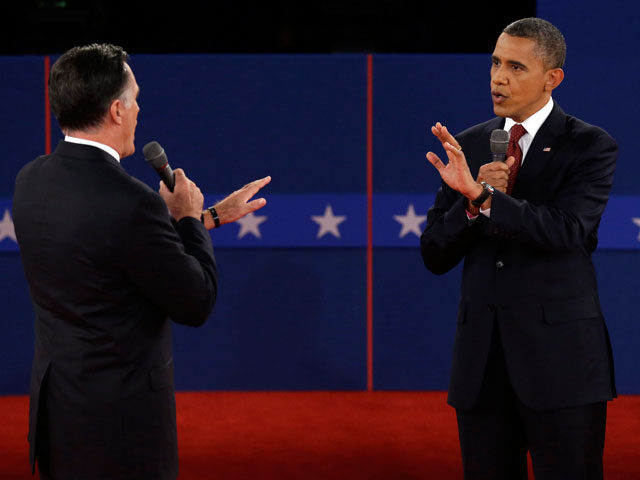Election Central’s Classroom Connection asks two AP Government classes at Worthington Kilbourne High School in Worthington, Ohio to give their opinions on the events of this year’s presidential campaign race.
Here, the students weighed in on the three presidential debates. –ed.
The First Debate
The first presidential debate was dominated by Mitt Romney. Romney emerged as the winner for multiple reasons. For starters, Romney appeared more comfortable on stage. He was engaged when President Obama was speaking and had charisma when he was speaking. This is contrary to Obama’s demeanor which was disinterested and lacking enthusiasm.
Romney also was able to get many of his main points in, such as his “five point plan.” Obama was not able to get as many points in this way. Another reason I personally believe that Romney was victorious in this debate was because he was very moderate and appealed to many undecided voters by not going too far right. Romney knew he already had all the votes of the extreme right so he focused on appealing to the middle part of the political spectrum. For example, Romney assured voters he was not going to cut taxes for the wealthy, but instead focus on the middle class which “has been buried in the last four years.”
The debate format played into Romney’s debating style well. He was aggressive and fought for his time to speak and when he did speak he attacked Obama. Obama on the other hand, laid back and let the attacks come. This debate format favored Romney because he was more engaged the entire time and the debate was left open, allowing anybody to control it. Personally, I liked this debate format because it allowed me to hear both sides full arguments and total justification without being interrupted by the monitor.
The result of this debate was a revival in the Romney campaign. According to a CNN poll, 67% of Americans believed Romney won the debate, which is a commanding two-thirds majority. With this type of a win Romney should be able to gain on Obama’s lead and make this a very close presidential race.
The Second Debate
Both President Obama and Governor Mitt Romney felt that they had something to prove in the second presidential debate. Romney felt the need to keep the momentum from his strong performance in the first debate, and Obama needed to “stop the bleeding” in the polls as a result of the first debate. Since the second debate was in the format of a town hall, the candidates were given questions straight from undecided voters who wanted to know the truth about the candidates’ plans.
Some of the main topics focused on during this debate were jobs, immigration, tax cuts, energy, and the Middle East. Both candidates were able to make valid points on all topics and seemed to be well-spoken, which made this debate much closer than the first debate.
The diverse backgrounds and experiences of Obama and Romney were very apparent in their discussions. Romney clearly and strongly presented his economic plan, describing tax cuts, job creation, and education. Obama won the hearts of many Americans with his explanation of foreign affairs. He explained his successes in that field over the past 4 years and was able to display a much better understanding of current foreign issues than Romney.
The main thing that the candidates were fighting for was the support of the middle class. Obama seemed to differentiate himself from Romney in this area during this debate. He was able to reassure people that things will get better despite Romney pointing out the flaws of the last 4 years. This one topic is what ultimately put Obama ahead in this debate. Obama’s successin this debate seemed to put a halt to Romney’s climb in the polls. This debate was the closest so far, and hints at how tight this race will continue to be throughout the rest of the campaigning season.



